Will City Get Bike-share Program?
Midwest Bikeshare has one-third of the money it needs to install 25 bikeshare stations with 250 bikes.
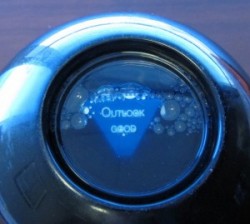
The Magic 8-Ball
Recently announced grants have spurred hopes that Milwaukee may soon join most other major cities and have a bike-share system. On Monday the 14th, it was announced that Midwest Bikeshare, Inc. received a $45,000 grant from the Funder’s Network for Smart Growth and Livable Communities. That grant will be matched with $75,000 from the Brico Fund.
With these grants, Midwest Bikeshare, a non-profit group set up to bring a bike-share system to Milwaukee, now has $500,000 of the estimated $1.5 million it needs to install 25 bike-share stations with 250 bikes.
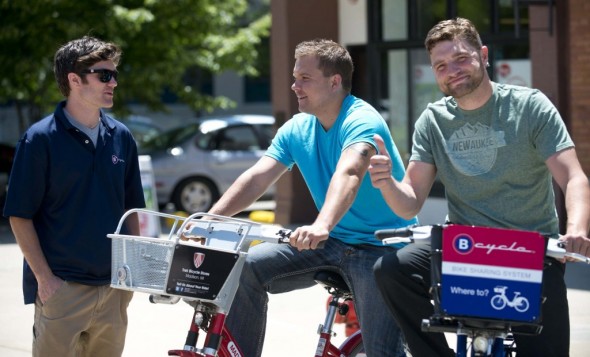
Thumbs up for the B-cycle demonstration in Milwaukee’s Third Ward last summer.
Bruce Keyes and Barry Mainwood, co-founders of Midwest BikeShare, Inc., said they remain hopeful they can raise the remaining funds and announce a Milwaukee system this year. “We are looking at a late June launch date, in time for Summerfest. At this point, I will be surprised if it doesn’t happen,” said Keyes.
Mainwood agreed, saying he thinks the recent commitment of a matching grant from the Brico Fund will encourage local business improvement districts, college campuses, large office building owners and corporations who have expressed interest to get off the fence and commit to stations or sponsorship.
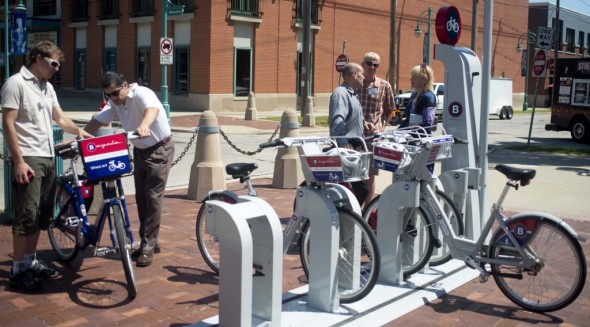
The kiosks are solar powered and wireless, so they can be set up quickly at any location. This one was part of the B-Cycle demonstration project in Milwaukee organized by Midwest Bikeshare last summer.
Because bike-share systems has proved so popular, 30 bike-share systems have sprouted up in medium to large cities all around the country in just the last handful of years, with more on the way. Chicago and New York are both set to launch large systems in 2013. I have written several times about the great Capital BikeShare in Washington, D.C. In the Twin Cities, Nice Ride Minnesota, now has about 1,400 bikes at 150 stations, and closed 2012 with 275,000 rides, up from 217,000 in 2011 and 100,000 in 2010. In all those years, only 4 bikes have been stolen or vandalized.
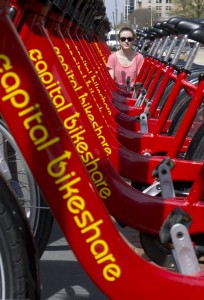
My daughter Frankie at a Capital Bikeshare kiosk in D.C. on our last trip there.
Here in Wisconsin, Madison’s B-Cycle bike-share system also saw significant growth last year. With 33 stations and about 290 bikes, B-cycle Madison membership grow from 471 annual members to 2,150, a 356% increase. Casual members grew from 5,915 to 11,453, a 94% increase. Together these members made a total of 63,325 trips via B-Cycle, that’s almost 45,000 more trips than in 2011.
Bike-share systems are not like typical rental bikes. They are designed for short trips rather than all-day rentals. A kind of pedestrian accelerator, the closely spaced stations allow people to make trips that are too long to walk but issues of parking and traffic make them too short to make driving practical in urban areas. Typically trips less than so minutes are free after a person purchases an annual or short-term membership. The last time I was in Washington for the National Bike Summit, I bought a three-day membership and made all my trips from Arlington (where I was staying) to the Hill with the bike-share bikes. When my teen-aged daughter came out to visit at the end of the trip, we got her a membership too and that made getting around from museum to museum much easier for the two of us.
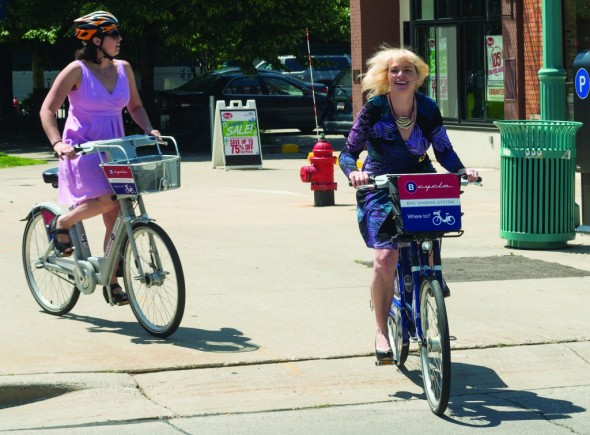
Beth Nichols, executive director of Milwaukee Downtown Business Improvement District, seems to be enjoying her ride on B-Cycle at the Milwaukee Demo last year.
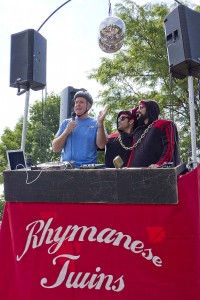
Mayor Tom Barrett and the Rhymanese Twins at last year’s Tour de Fat, predicting Milwaukee will have a bike sharing program soon!
Bike-share in Milwaukee makes a lot of sense to link the campuses, central business district, and nearby neighborhood destination in Bay View, Brady Street, the East Side, Walker’s Point, Historic Third Ward, etc. By putting stations downtown and near the restaurants and retail stores in these neighborhoods, people who work downtown could get lunch or do shopping during their lunch hours, tourists and visitors staying downtown could see more of the city as well. Midwest BikeShare estimates it will cost about $15,000 a year to have a 10 bike kiosk, that seems like a no brainer for the hot retail neighborhoods with business improvement districts.
I am already fielding calls from visitors to Milwaukee who have come to expect to find a bike-share system where they travel for business. About a month ago I got a call from someone from Montreal visiting for a convention. He told me he was pleasantly surprised at the quality of the Milwaukee Art Museum, but didn’t have time to walk there between sessions at the convention he was attending. He asked if there was a bike-share system, but I had to direct him to a shop to rent a bike for the three days he was in town. That cost a lot more than a short-term bike-share membership would have.
Any businesses interested in sponsoring a kiosk or advertising with a Milwaukee BikeShare system should contact Jack Hirt, Barry Mainwood or Bruce Keyes at Midwest BikeShare.
This story was originally published by the Bicycle Federation of Wisconsin.
Bike Czar
-
Join a Bike Ride Under the Polish Moon
 Jun 1st, 2018 by Dave Schlabowske
Jun 1st, 2018 by Dave Schlabowske
-
9 Reasons to Join National Bike Challenge
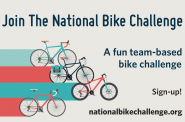 May 4th, 2018 by Dave Schlabowske
May 4th, 2018 by Dave Schlabowske
-
Biking Through the Mindoro Cut
 Apr 27th, 2018 by Dave Schlabowske
Apr 27th, 2018 by Dave Schlabowske

















I used bike share in Paris and in Denver. This is a terrific way to go. I would be thrilled to have this in Milwaukee. Thank you!
Do the math – works out to $6,000 per bike! I am not opposed to these types of programs, but the cost/benefit has not been established. Other bike sharing programs (Paris, Washington, D.C.) have proved unsustainable due to theft and vandalism of the bicycles. The business model for successful programs has not yet been established.
D.Johnson,
Your math may be accurate, but you are solving the wrong problem. That cost is for the BikeShare program, not the bikes. Including the cost of the kiosks would be like Hertz including the cost adding the cost of all the labor, offices, computer systems, etc. needed for to buy a new rental car when their fleet gets old.
As for the sustainability of the business plan, it has most definitely been proven to work. The programs are all working great everywhere they have been in place. I use the one in D.C. every time I go there. I inteviewed the company that operates the Capital Bikeshare system, and they reported very few thefts and extremely limited vandalism. The Paris program is running great and has a sustainable, sound business model. Closer to home, Madison B-cycle is experiencing rapid growth, as is the Nice Ride Minnesota system in Minneapolis and St. Paul. The Twin Cities only had four bike stolen.
@D. Johnson While Paris certainly has an problem with theft, it likely stems from the locking mechanism at Vélib’s stations being poorly designed, here in the US things are a bit of a different story:
DC/Arlington’s Capital Bike Share theft rate is less than 1%.
And another example Minneapolis had one bike stolen in 2011.
From what I can see Denver, one of the largest US systems, has reported 2 bikes stolen.
Now early bike-sharing systems (just essentially free no lock bike-sharing systems) did have theft/vandalism as a significant problem, the newest versions don’t have this as a huge issue. It part because of gps technology and the fact you have to have a credit card to check a bike.
Also, the bcycles use non-standard parts to deter folks from ripping off components.
Even using D. Johnson’s inflated cost per bike and assuming a 6-month “season,” that only requires the program to achieve $33/day per bike in order to pay off all starting costs within one year. If you apply a more realistic 3 year time frame for recouping the costs, each bike simply needs to generate $11/day. Depending on the rental rates, that may only require two rentals each day, which hopefully is a gigantic underestimation of their use.
Let me know if my back of the envelope math is off, but this project seems entirely reasonable considering the benefits it will have to the community.
I have seen these in Madison, but not sure on the costs per use?
Good to hear this is going somewhere.
I am curious, though, if any of you know if a GPS bike-based system like SoBi (http://socialbicycles.com/) has been looked into? It seems impressively cheaper and more flexible, especially in terms of events and seasonal usage [think: during the semester at UWM and Marquette or at Summerfest], as well as coverage area–the bikes end up where whoever’s using them is going. I guess the main downside of not having kiosks is that users have to connect to the system using their own devices.
Also, it has the potential to generate some sponsorship revenue through location based advertising for the users. Though with B-cycle it sounds like there’d be sponsor-branded stations on our streets, which seems like it could be a fair trade-off for getting a system going.
Hi Carl,
The third generation bikeshare programs like SoBi are definitely interesting, but it seems like they are not as proven yet. I think they work better on a campus basis than in a larger metropolitan area. Definitely something to watch though.
As for sponsorship dollars, that is a big part of some bikeshare system business plans. For instance, Blue Cross is a big sponsor of the Nice Ride Minnesota system.
@ getch,
Most bikeshare systems rely on short term or annual memberships as a primary revenue source. While systems vary, B-Cycle Madison has an annual membership fee of $65 and a single day membership fee of $5. After that, trips less than 30 minutes are free. It is an additional $2 for up to an hour, and $5 per every half hour after that.
Hi Dave,
Yeah, I guess choosing a very proven system has it’s advantages. The third generation systems do seem to be the direction bikesharing (or carsharing, for that matter) is headed, though, and the cost point sounds like a big advantage. Any reasons in particular you see it not working on a larger scale yet? I guess doing a starter implementation for part of the city would be doable by setting geographic boundaries where users can park the bikes (= what carshing á car2go does).
Slightly off-topic but maybe of interest and the comments seem to be closed on the cargo bike story from last summer. I just ran into that there’s a cargo bike in Milwaukee on this p2p sharing site: http://www.velogistics.net/.